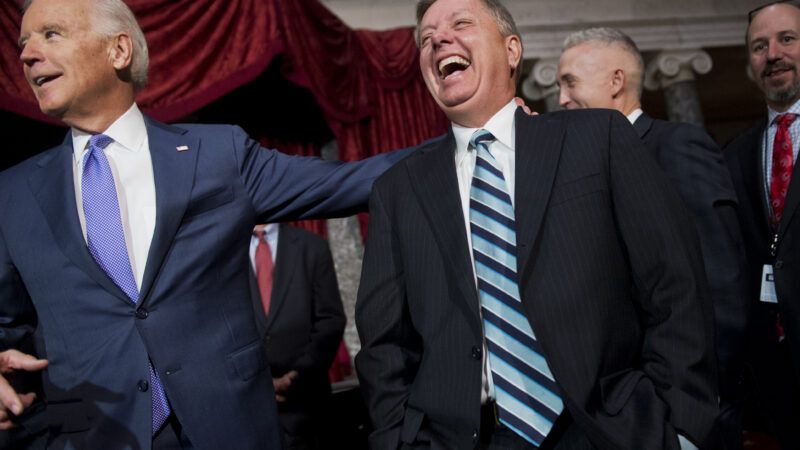Biden and Graham Reportedly Schemed on How 'To Go to War For Saudi Arabia'
The Republican senator said it would “take a Democratic president” to commit American troops to defend the Saudi kingdom, according to a new book.

Democrats and Republicans can't agree on much. But when it comes to sending Americans to war, the two parties are often willing to set aside their differences. In his new book War, investigative journalist Bob Woodward reports that Sen. Lindsey Graham (R–S.C.) had a shockingly blunt conversation with President Joe Biden about how to make it happen.
Graham reportedly said that only Biden could secure a U.S.-Saudi defense treaty, because it would "take a Democratic president to convince Democrats to vote to go to war for Saudi Arabia" during a meeting last year. "Let's do it," Biden responded, according to Woodward.
The conversation took place in the context of Biden's attempts to negotiate a "megadeal" between the United States, Saudi Arabia, and Israel. Graham had a publicly reported meeting with Saudi crown prince Mohammed bin Salman in support of the deal in April 2023. The idea, which Republican vice presidential candidate Sen. J.D. Vance (R–Ohio) also supports, was to create a permanent, U.S.-led security alliance in the Middle East.
At the time, the Biden administration was downplaying the level of commitment it was willing to offer Saudi Arabia. Anonymous officials kept claiming that the proposed agreement would fall short of a full commitment to go to war. As a trial balloon, the administration signed a vaguely worded defense agreement with Saudi ally Bahrain without asking Congress, and insisted that it "does not cross the threshold of a treaty."
But behind closed doors, the administration and its allies were reportedly very straightforward about what they wanted to commit Americans to do. Graham told Biden at the White House that bin Salman is "willing to do [the deal] because he gets under our nuclear umbrella and he doesn't have to worry about building a bunch of bombs," according to Woodward.
The book does not say exactly when the meeting took place, except that it was several months before the October 7, 2023, attacks on Israel. In the same conversation, Graham reportedly said that a Republican administration wouldn't be able to secure such a deal.
"Democrats wouldn't vote for it if [former president Donald] Trump introduced it because they hate [Israeli Prime Minister Benjamin Netanyahu] and they hate Trump," Graham told Biden, according to the book. "Republicans would vote for the defense agreement with Saudi Arabia if Israel encouraged us to. We can get 45 Republican votes."
Biden assured Graham that he could get the rest of the votes from the Democratic caucus, Woodward reports.
Graham then reportedly conceded that Trump should get "his fair share of the credit" for any U.S.-Saudi deal because of the Abraham Accords, a treaty between Israel, the United Arab Emirates, and Bahrain that Trump brokered. That's when Graham dropped the line about getting "Democrats to vote to go to war for Saudi Arabia," and Biden agreed.
Woodward claims that Graham even encouraged bin Salman not to risk dealing with a future Trump administration.
"If you want to recognize Israel, you've got to do it on Biden's watch," Graham told the Saudi prince in March 2024, according to the book. "There's no way you're going to get Democrats to vote for a defense agreement to go to war with Saudi Arabia introduced by Donald Trump."
Neither Graham's office nor the White House's National Security Council responded to a request for comment.
Although his reported comments were harsh, Graham was probably not wrong. Congress was much stricter about war powers—and U.S. support for Saudi Arabia specifically—during the Trump era than it has been since Biden took office.
In 2019, both the House and the Senate voted to end U.S. involvement in Saudi Arabia's war effort in Yemen, only for Trump to veto their resolution. But in 2022, the Biden administration convinced Sen. Bernie Sanders (I–Vt.) to withdraw a similar resolution, by arguing that the president needed flexibility to secure a peace agreement in Yemen.
Still, a formal defense pact was a much taller order. Sanders and 19 other Democratic senators signed a letter on October 3, 2023, expressing their "concern" with the idea of committing American troops to defend "an authoritarian regime which regularly undermines U.S. interests in the region."
What finally killed the deal—or at least put it in suspended animation—was bin Salman's own cold feet. After the October 7 attacks put the Israeli-Palestinian conflict front and center in Arab politics, the Saudi leader began to see it as a dangerous liability.
In early 2024, Saudi negotiators reportedly tried to cut Israel out of the megadeal, an idea the Biden administration rejected. Bin Salman even began telling U.S. officials that he feared being assassinated if he did not stand up for Palestinian rights, Politico and The Atlantic reported.
"Do I care personally about the Palestinian issue? I don't, but my people do," bin Salman told U.S. Secretary of State Antony Blinken in January 2024, according to The Atlantic. "Half my advisers say that the deal is not worth the risk. I could end up getting killed because of this deal."
Since then, the Biden administration has continued trying to court bin Salman, publicly urging Israel to "take advantage of the opportunity" by giving Saudi Arabia some concessions on Palestinian rights. The crown prince's concern for his life seems to have made an impact.
The risks that American troops would be asked to take for the kingdom were a lesser concern. If Woodward's reporting is to be believed, Biden and Graham found those lives quite easy to trade away.


Show Comments (74)